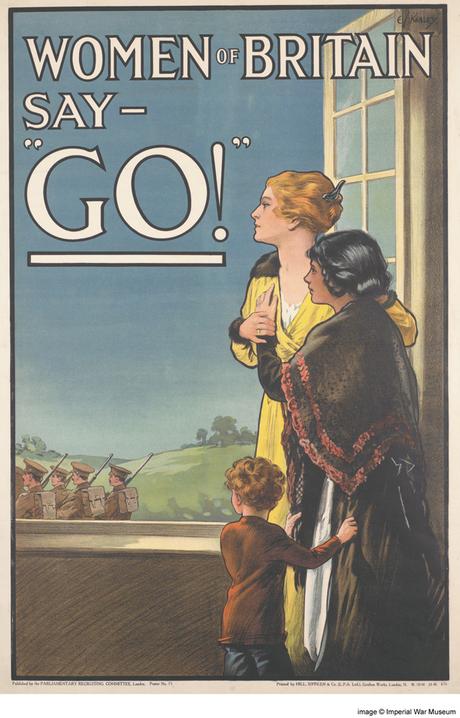This is one of the many posters that encouraged men to enlist in the army during World War I. This poster, in particular, focuses on the women and children in the war. World War I is the first war where all members of the society participated, directly or indirectly, in the war. When the men were away, women worked in the factories and were hired into the army to serve as nurses and cooks. Although only men were allowed to go fight on the frontiers, women were active, patriotic, and passionate about the war. On the other hand, World War I was the first modern war where the armies intentionally aimed their attacks at local civilians. The “weak”—women, children, and elders—were the main targets of the attacks. As a result, the emotions of women during the time of warfare changed: they not only worried about the safety of the men in the armies, but are they were also concerned about their own lives (“The Home Front during the First World War”). In text citation
In the poster, a British woman and her two children look out their window and watch the army march away. The mother holds her older child’s hand over her chest, and the younger child tugs on his sister’s dress. Their eyes are filled with longing and anxiety, but at the same time, they are proud of the men fighting for the country. The top of the poster is the title “Women of Britain Say “Go!” with emphasis on the word “Go!” The artist E. J. Kealey is trying to encourage the men to go fight for the glory of Britain, bring justice to Belgium, and protect the country from any possible foreign attacks. Men would see this poster and feel the urge to protect the “weak” women and children; they would want to bring safety and peace to the women and children. Kealey is also suggesting that the women should stay home and take care of the children, instead of trying to go the frontier and fight side-by-side with the men. Kealey believes that women are responsible for the health and growth of their children, and for maintaining the household while the men are away.
“The Home Front during the First World War.” BBC. 27 April 2011. <http://www.bbc.co.uk/schools/gcsebitesize/history/mwh/britain/homefrontrev_print.shtml#top>.

DBQ
ReplyDeleteLOL YEAH IM DOING IT RIGHT NOW. DOCUMENT BASED QUESTIONS ARE A PAIN. Ur in college now I assume?
Delete
ReplyDeleteنقدم لكم شركه الحمد للنظافه العامه بالرياض حيث لدي عمالنا العديد من الخيرات في هذا المجال ليس عليك سوي الاتصال بنا
شركة نظافة عامة بالرياض
the other woman is not her child, she is a Belgian refugee.
ReplyDelete@farah almeer, Rightly said
ReplyDelete